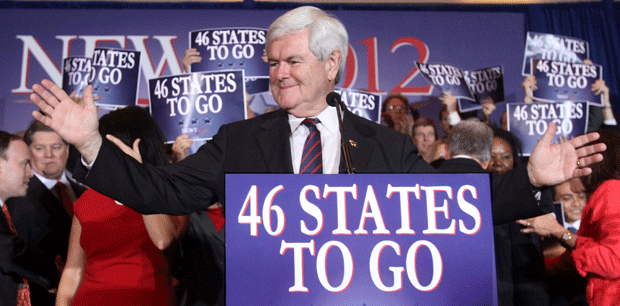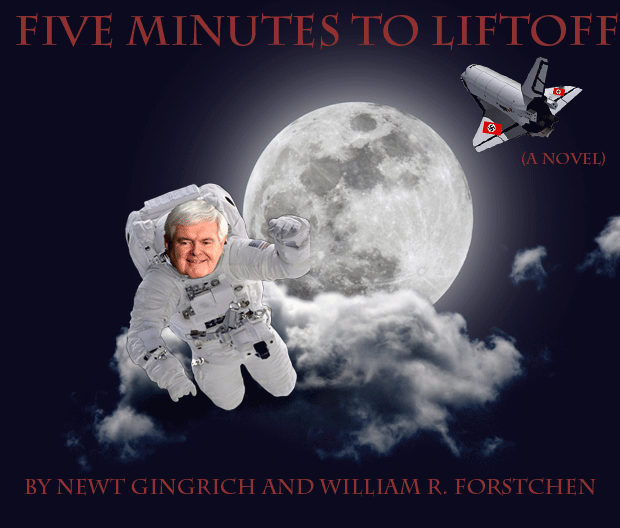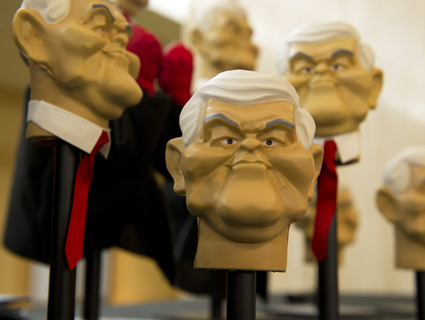
Former speaker of the house Newt Gingrich, in happier times.Mark Makela/ZumaPress.com
Newt Gingrich thanked all of the usual suspects at his campaign sendoff in a crowded room in the second floor of the Ballston, Virginia, Hilton on Tuesday. He thanked his two debate coaches, grandson Robert and granddaughter Maggie. He thanked his wife, Callista. He thanked Bill O’Brien, the speaker of the New Hampshire House of Representatives. He thanked Texas Gov. Rick Perry, satirist Herman Cain*, and former Alaska First Dude Todd Palin.
Then he threw in two more names. “And of course, while they weren’t directly associated with the campaign, it would be impossible for me to be here without Sheldon and Miriam Adelson, who single-handedly came very, very close to matching Romney’s super-PAC,” he said. “I’m very, very grateful.”
To the extent that Gingrich’s 2012 presidential campaign will be remembered by future generations, it will be not because of any comments about moon bases or kosher meals or electromagnetic pulses or penguins (okay, perhaps the penguins). It’ll be because of the transformed campaign financing system he relied on.
Over the course of the campaign, Sheldon Adelson, a wealthy Las Vegas casino baron, and his wife Miriam, gave $20 million to the pro-Gingrich super-PAC Winning our Future, a sum that amounted to well over half of the overall contributions. Other super-PACs brought in more, but few relied as heavily on one funding stream. Gingrich’s own outfit struggled with fundraising from the start (it’s currently $4 million in the hole); without the Adelsons, there was no campaign. It was a glimpse into the post-Citizens United dystopia, in which political candidates were little more than Second Life-avatars for their affiliated donors.
As for the farewell address, it was Gingrich distilled to his concentrated essence. He described the United States as “a country that was founded in 1607” by John Smith. In one memorable 45-second burst he rattled off proper nouns like a bingo hall announcer on meth (more on that in a second): “health savings accounts”; “people in Chile”; “Galveston, Texas”; “radical Islam, Saudi kings, and Chinese bond-holders.” He thanked President Obama for traveling to Afghanistan but chided him for failing to recognize that “the center of Al Qaeda today is Yemen” (this last bit was admittedly tough to hear over the drones).
And although he noted that Callista had told him that the “moon colony was probably not my most clever comment in the campaign,” Gingrich was ready to declare victory on his signature campaign issue. He noted that Google was already considering a plan to mine minerals on asteroids and Richard Branson was on the verge of launching his own Virgin Galactic space program. Space is important because it gives kids something to aspire to, he said. “I happen to think that’s a better future than methamphetamine and cocaine.”
From here, Gingrich’s role is unclear. He left without taking questions and his spokesman, R.C. Hammond, was mum on whether a formal endorsement of Mitt Romney was imminent. “You guys got 617 numbers you can call?,” he said, referring to Romney’s Boston office. “Leave me alone!”
Most likely, though, Gingrich will reprise the role he never fully left behind—traveling pitchman. His 12-month odyssey seemed at times like an effort to redefine “retail politics” into something more literal; campaign stops were often punctuated by book signings and special screening of his production company’s documentaries. Truth be told, my main interest in checking out Gingrich’s farewell address was to snag an exit interview with the single best symbol of Gingrich’s book tour candidacy—Ellis the Elephant, the time-traveling pachyderm star of Callista’s children’s book. A ubiquitous presence on the campaign trail, Ellis’ identity was never revealed, except to note that he moonlighted as a paid staffer for the Gingrich campaign.
No luck. For once, the gray furry elephant in the room wasn’t in the room at all.
*Throwing it out there.








